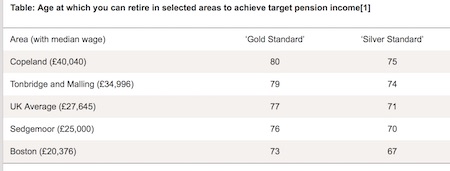New analysis published this morning has shown big variations across the country when it comes to how long workers face having to work to achieve the same quality of pension as their parents’ generation.
Workers in higher wage areas will have to work up to seven years longer than those in low wage areas, it has been estimated, in order to make sure that they can maintain their standard of living when they retire.
The Royal London study found that someone on the national average wage who starts saving for a pension at age 22 and pays in only at the statutory minimum level required by the Government (8% of a band of earnings) would need to work to 77 to get the sort of ‘Gold Standard’ pension enjoyed by many of their parents’ generation.
This was defined as a total pension (including state pension) of two thirds of pre-retirement income, with protection against inflation and something for a surviving spouse. To get a ‘silver standard’ pension of around half of pre-retirement income, the same worker would need to work to 71.
But how long someone faces having to work depends on how much they are earning.
With the state pension being the same level everywhere in the country (around £8,000 per year from April 2016), workers in high wage areas will have to build up much more private pension to maintain their higher living standard in retirement than those in lower wage areas.
The following table shows how long you would have to work to get a ‘Gold Standard’ or ‘Silver Standard’ pension in selected local authority areas based on the typical full-time wage in those areas.

Steve Webb, director of policy at Royal London said: “It is great news that millions more workers are being enrolled into workplace pensions, but the amounts going in are simply not enough to give people the kind of retirement they would want for themselves, and certainly not the sort of pensions that many of those retiring now are enjoying.
“Even in lower wage areas people face working into their early seventies to get a comfortable retirement. In higher wage areas, the state pension makes a much smaller contribution so workers in those areas face working well into their seventies.”

